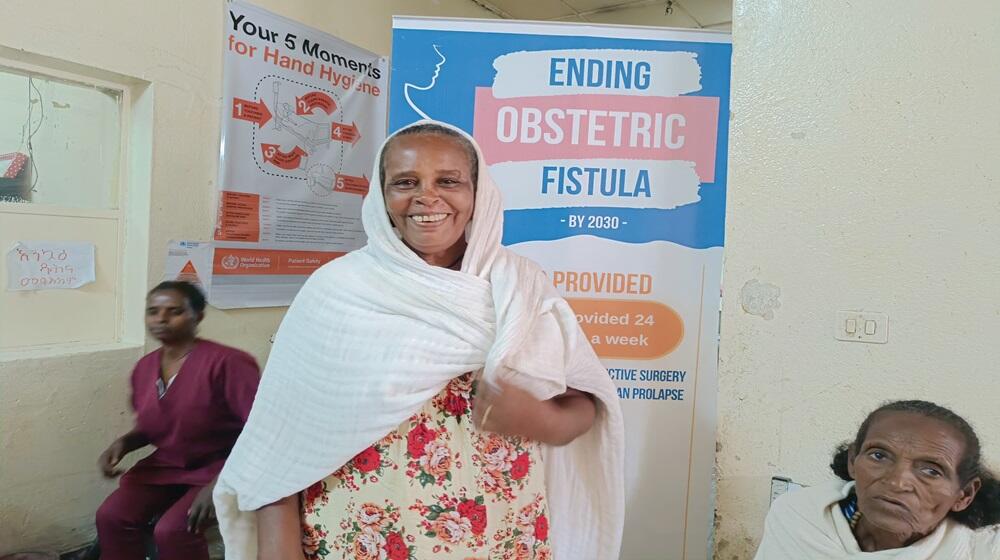Fifty-six-year-old Letay Gebretsadik, a woman from Hawzen Town from the Eastern Zone of the Tigray Region, came to the Mekelle General Hospital seeking treatment for Pelvic Organ Prolapse together with her 45-year-old younger sister. She says that she led a tough life.
She gave birth to 11 children and engaged in backbreaking work on the farm alongside her husband, most of the days with a child on her back. She did her best trying to make sure that her kids had what they needed. She sacrificed herself to educate and support them.
Six years ago, Letay started experiencing Pelvic Organ Prolapse (POP). This is a health condition where one or more pelvic organs such as the uterus, bladder and/or intestines descend into the vaginal canal due to weakened pelvic support. POP occurs due to prolonged labor, large fetal size, instrumental delivery (using forceps or vacuum), multiple births, and heavy physical labor.
It was painful for Letay. She struggled to urinate and had to manipulate the mass every time she visited the toilet. The mass became larger creating more pain with time as its skin dried up and became ulcerated. She could barely walk, struggled to sit down and became nearly bedridden. She felt ashamed and could not explain to her children what was going on. She hid her suffering as best as she could and tried to survive from day to day. She could not receive any service at the nearby health center because it was damaged by the conflict.
Campaign to screen and treat Pelvic Organ Prolapse
The Regional Health Bureau estimates that there are more than 10,000 women with POP in Tigray. However, until now, no support was available to provide treatment to these women. Through support from the Ministry of Women and Social Affairs, Tigray Region Health Bureau, World Bank, UNOPS, the Government of Canada and UNFPA, more than 3,000 women were screened in campaigns that were conducted in Shire, Axum, Adwa, Adigrat, Maichew and Mekele. Surgical treatment was provided to more than 750 mothers with 3rd and 4th degree POP.
Letay heard about the campaign from a Health Extension Worker in her village. At first, she was too scared to come for treatment. But she eventually mustered the courage to talk to her sister who was also suffering from a similar condition and they decided to go to the Mekele General hospital for treatment.
“My sister underwent surgery and is recovering now. I must wait a bit because of my high blood pressure but I pray that my surgery will also be successful,” says Letay full of hope. “I have suffered for a long time. Like most women, I carried my burden silently because I did not know that there was a solution.”
Yordanos is the Head Nurse who coordinated the POP campaign at Mekelle General Hospital. She says she was extremely happy to be part of the campaign and to offer care to the women who have been suffering for many years from different complications. “It is a privilege to be able to support these women. The hospital dedicated half of its ward for this service and the treatment was made possible with the support of Mums for Mums and UNFPA. There are many more women with similar problems throughout Tigray, and I ask for the support to be continued until we reach them and alleviate their suffering.”
There is a plan to increase community outreach for awareness creation and provide screening and treatment of the remaining suspected cases, integrating it with activities for the identification of women with Obstetric Fistula. Support will also be provided for hospitals to integrate the surgical treatment of POP into their routine services.
“I want to express my thanks for the support I received and for the loving care the doctors gave me. We also received transportation support, given very good accommodation, and are eating well. I could not have afforded the treatment if it wasn’t for you and would have continued to suffer until God knows when,” remarks Letay. She is looking forward to teaching her neighbors about this so that they can also come and receive treatment.


